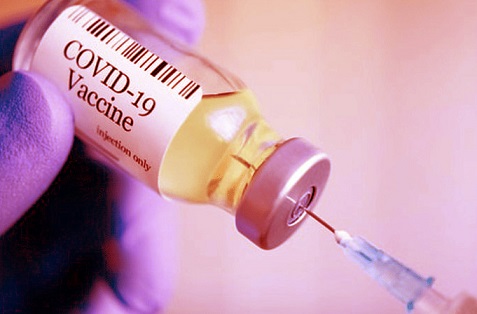Swedish Case of Ephemeral Diabetes After COVID-19 Vaccination Case Sparks Interest
Nikhil Prasad Fact checked by:Thailand Medical News Team Dec 21, 2024 1 year, 5 days, 13 hours, 53 minutes ago
Medical News: A recent medical case has brought to light an unusual form of diabetes that emerged after COVID-19 vaccination and then disappeared spontaneously. The condition, dubbed "Ephemeral Diabetes," challenges current understanding of diabetes onset and remission. This case study, documented by researchers from the Department of Internal Medicine, Division of Endocrinology and Diabetology at Gävle Hospital, Sweden, highlights the story of a 58-year-old male patient with a surprising and unexplained trajectory of diabetes.
 Swedish Case of Ephemeral Diabetes After COVID-19 Vaccination Case Sparks Interest
Swedish Case of Ephemeral Diabetes After COVID-19 Vaccination Case Sparks Interest
The patient's journey began after receiving three doses of COVID-19 vaccines - two from Pfizer and one from Moderna. About a week following his final dose, he developed severe diabetes symptoms, including excessive thirst and frequent urination. Diagnostic tests revealed significantly elevated blood sugar levels and glycated hemoglobin, indicative of long-term uncontrolled diabetes. Unlike typical cases of type 2 diabetes, his condition resolved within months, defying medical expectations. This
Medical News report explores the details of this case, the potential implications, and the questions it raises for future research and medical practice.
What Makes This Case Unique
Ephemeral Diabetes differs greatly from the usual progression of diabetes. It presented as a severe, type 2-like diabetes but lacked key markers commonly associated with autoimmunity or insulin deficiency. The patient had a fasting blood sugar level of 27.5 mmol/L (495 mg/dL) and an HbA1c of 14.6%, both far exceeding normal ranges. However, after five months of treatment with metformin and empagliflozin, the patient chose to stop his medications. Surprisingly, his blood sugar levels normalized without further intervention, and he remained in good health for over two years.
The patient’s case is particularly intriguing because there were no significant lifestyle changes - no weight loss, dietary shifts, or increased physical activity - that could explain this spontaneous remission. Medical experts involved, including Dr. Åke Sjöholm and Dr. Sarah-Ålivia Mänd, emphasized that such remission is extremely rare in type 2 diabetes, where the disease usually progresses over time without significant intervention.
Insights Into Diagnosis and Treatment
The patient’s diagnosis was supported by extensive testing. Blood glucose and HbA1c levels were abnormally high during his initial evaluation. Additionally, tests for autoantibodies against β-cell antigens, such as glutamic acid decarboxylase and insulinoma antigen 2, came back negative, ruling out autoimmune diabetes.
Initially, treatment involved oral antidiabetic drugs, which successfully managed his glucose levels. Yet the true surprise came when these treatments were discontinued, and his condition did not relapse. As of his most recent check-up, the patient maintained normal glucose regulation, even after consuming meals high in carb
ohydrates. His fasting glucose and HbA1c levels returned to within normal ranges, and follow-up tests showed no signs of glucose intolerance.
Potential Mechanisms and Speculation
The mechanisms behind this case remain elusive. Researchers speculate that the patient’s diabetes might have been triggered by an unusual immune or inflammatory response to the COVID-19 vaccine. However, it is also possible that the condition resulted from an unrelated temporary dysfunction of β-cells in the pancreas. Notably, no definitive link between COVID-19 vaccines and new-onset diabetes has been established in population studies. While some anecdotal reports exist, large-scale analyses have failed to confirm a causal relationship.
This patient’s case challenges these findings and underscores the need for further investigation. It also raises the question of whether certain individuals might experience transient metabolic effects following vaccination that are not captured in broader epidemiological studies.
Implications for Diabetes Research
Ephemeral Diabetes has implications that extend beyond this singular case. Understanding the mechanisms of spontaneous remission could provide insights into diabetes management and even prevention. This case highlights the resilience and adaptability of β-cells, offering a glimpse into how they might recover from dysfunction under certain circumstances.
Moreover, this case underscores the importance of personalized medicine. This case suggests that rare adverse effects from COVID-19 vaccines might occur in specific individuals.
The Broader Context of COVID-19 and Diabetes
Since the onset of the COVID-19 pandemic, there has been growing interest in the relationship between the virus, its vaccines, and diabetes. Some studies have reported transient hyperglycemia during SARS-CoV-2 infection, often attributed to the cytokine storm triggered by the virus. In severe cases, the use of corticosteroids - known to elevate blood sugar levels - complicated the interpretation of these findings.
In contrast, the role of vaccines in diabetes development remains controversial. While some anecdotal evidence suggests a potential link, large-scale reviews have largely dismissed any significant association. This case, however, suggests that rare individual responses may warrant closer scrutiny.
Conclusions and Future Directions
The case of Ephemeral Diabetes raises more questions than answers. Its highly unusual presentation and spontaneous resolution challenge conventional understanding of diabetes. Researchers from Gävle Hospital hope that this case will inspire further studies into the factors that might contribute to such transient metabolic disturbances.
For clinicians, this case serves as a reminder to remain vigilant for unusual presentations of common conditions. It also highlights the importance of monitoring patients closely after vaccination or other medical interventions, particularly if they have risk factors such as obesity or a history of metabolic issues.
The study findings were published in the peer-reviewed journal: JCEM Case Reports.
https://academic.oup.com/jcemcr/article/3/1/luae228/7923299
For the latest Vaccine News, keep on logging to Thailand
Medical News.
Read Also:
https://www.thailandmedical.news/news/various-peer-reviewed-published-studies-and-case-reports-show-that-mrna-covid-19-vaccines-can-cause-lymphoma
https://www.thailandmedical.news/news/breaking-covid-19-news-doctors-in-thailand-warn-that-covid-19-vaccines-could-possibly-lead-to-tumor-expansion-in-certain-cancers
https://www.thailandmedical.news/articles/vaccine-news
